By Assunta Ng
NORTHWEST ASIAN WEEKLY
Frustration, disappointment, and anger over the City of Seattle’s inability to deal with public safety in Chinatown-International District (CID) for years, were voiced at a rare gathering on Oct. 11 at Tai Tung Restaurant.
More than 60 people, mostly developers, property owners, business owners, and top management, met for the first time to express their concerns, which resulted in a joint statement and a letter to the mayor on Oct. 16. The letter stated that “CID and areas near it have been a public safety hotspot for several years where it is getting worse, and quickly. This is due to several factors, including proximity of several homeless encampments around this neighborhood, the siting of a Navigation Center in Little Saigon, establishment and growth of open-air drug market on 12th and Jackson, drug/fentanyl use throughout the neighborhood, vandalism to various businesses, and the recent Wing Luke Museum property damage as a result of anti-Asian hate crimes.”
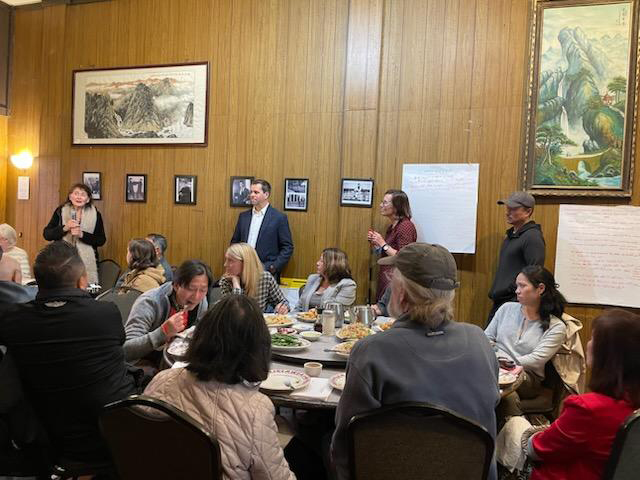
From left: Jan Johnson, owner of Panama Hotel speaks at the Oct. 11 meeting at Tai Tung Restaurant, while organizers Brad Padden and Lisa Nitze-Stagen, and Robin Leong, owner of the Seattle Kung Fu Club, listen. (Photo by Assunta Ng)
It’s not just the CID. The city, as a whole, has an unfavorable image on the issues of public safety.
“Seattle is the 158th safest city in America. The city ranks 163rd for thefts and hate crimes per capita, landing as low as 160th for home and community safety,” according to WalletHub senior analyst Jill Gonzalez.
“Seattle has been on a downward slope since 2020, when it ranked 116th. In 2021, it went down to 133rd and then to 148th in 2022.”
The crisis
It began with the pandemic shutdown, followed by numerous homeless camp sites, crimes, vandalism, graffiti all compounded together with the growth of the drug/fentanyl crisis non-stop in the CID.
“I am a victim in CID’s [public safety situation],” said Teddy Deng, House of Hong Restaurant’s owner. “I have invested $12 million in remodeling the restaurant. But there were so many break-ins, they went inside and destroyed all the electric boxes (and other items).”
Hong was the first CID business to close during the pandemic and is still closed after more than three years of remodeling.
“My employees didn’t want to come to work in Chinatown,” said Felicity Wang, owner of Asia Pacific Travel, “so I have to close the business. I have heard that the government has abandoned us. I hope this is just a rumor.”
The Ding How Center property on 12th Avenue South used to be one of the most “troubled hotspots in the CID.” It has lost as many as 15 businesses including several popular restaurants and professional tenants due to 20 to 30 homeless shoplifters and drug addicts congregating outside the building for more than two years, discouraging customers from patronizing the businesses. Though the police cleaned out that site last year, the homeless and drug addicts have now drifted down to half a block at the corner, where the strip mall is.
Lately, the Center’s parking garage has been a target of drug addicts hiding inside smoking and dealing drugs, according to Henry Koo, building manager.
“Inside the garage, 10 to 20 people not only smoke drugs, they urinate, break into cars, steal the parts, and destroy vehicles.
“The air is toxic inside the garage, it causes not only stinky odor but headaches and sickness. It takes many people to clean up the garage each day. Nobody wants to park there.”
At the corner fenced stripe mall of seven to eight storefronts on 12th Avenue South and South Jackson, several homeless and drug addicts are hanging outside, usually when police are not present. They don’t just wait for free food.
Koo, who also manages the corner mall, suspects one of the tenants is selling drugs. He said the property owner is considering donating one of the empty spaces for a police substation to make Little Saigon safer.
A representative from Fa Sheng Temple on 10th Avenue South, said he has to deal with homeless people frequently as they “camp around the area, making lots of noise and even knocking on doors.”
Dr. Lund Chin, owner of the Seattle Vision Clinic, said the homeless, vandalism, and sanitation issues have long created problems for his properties, and he has lost five to six tenants.
Other building owners echoed the same concerns that their residents are afraid of what’s going on in the CID.
Jerry Lee, a frequent patron of CID said he proposed a baseball lunch for 100 people in the CID. But when organizers saw the broken glasses from the cars smashed on the ground, they said no.
The list of complaints including how the homeless harassed the customers, the sanitation problem, and more went on and on…
Because of public safety, one property owner said she thought about moving away from the CID. “It’s scary to walk around.”
The loss of businesses
The mass exodus of small and big businesses in the CID, over 40 in the past three years, has been staggering. Some of them such as Viet Wah Supermarket had been in the CID for as long as 40 years. They tolerated the situation for as long as they could, even with the frequent amount of vandalism and shoplifting.
One shoplifter even dared the employee, “Why don’t you call the police?” But the last straw was when a homeless person stole merchandise and hit an employee. The owners decided that they had enough and shut the store down last year. Viet Wah owners said they still have an office in the neighborhood, but seldom use it.
“Even with the Taylor Swift event and All Star Game nearby, it did not bump up business in the CID,” said Larry Matsuda, an author and retired educator, who was at the meeting. “The answer is that many people view the CID as unsafe. From their point of view, it is smart to avoid it.
Organizing the meeting
Unlike past community meetings dominated by activists, nonprofit organizations, and senior residents, this was the first meeting called by CID developers from both profit and nonprofit organizations to join forces and work with the city to find solutions on public safety.
Brad Padden and Lisa Nitze-Stagen of Housing Diversity Corporation, developers of affordable housing at 701 South Jackson Street, who have witnessed the deterioration of CID public safety, have approached David Della, principal of Eco-Ready, LLC, to organize the meeting with community stakeholders.
“To get the city’s attention,” said Della, “and starting with the mayor, the most visible leader, will set the tone. It will be beneficial for the mayor to hear what the group has to say.”
The result of the meeting is a coalition formed from Oct. 11 participants, and a letter will be sent to Harrell to engage the city to seek solutions.
“The language of the letter has toned down the temperature of the meeting,” said Della. “It will be a small group to start the conversation,” and then develop some short and long-term strategies, including regular meetings to engage other city’s department heads.”
They also approached Tony Au, a community organizer and business owner to help in getting stakeholders to attend.
“I have heard these complaints about safety in CID for a long time,” said Au. “But the complaints have been increasing. First, the grievance was from the working class about safety, then the middle class, and now the people (developers) who are the highest taxpayers to the city. They said if the situation does not get better, they are not going to invest in our community. Our community needs their support. Our city needs their support.”
Initially, Della thought 30 people would show up. The actual turnout was double that number.
Love for CID
Despite public safety declining in the CID and criticisms towards the city, many attendees’ affection towards CID never fades.
Joel Ing, a partner with Edge Developers, located in Little Saigon and close to the Navigation Center, has shared stories about what happened every day including shooting and homeless people asking for money, and his kid being freaked out by some incidents. Yet, “there’s no other place we would rather want to have a business (than the CID).”
Sometimes, Ing prayed, “Hail Mary,” before he walked out of his office and on the street. Ing and a few others, like Denise Moriguchi of Uwajimaya and Robin Leong of Seattle Kung Fu Club, at the meeting have been connected to the community for more than a century, since their grandfathers had built their roots in the CID.
Despite CID challenges, “my loyalty is with Chinatown,” said Wang. “I want to see Chinatown grow.”
Solutions
“We need long-term solutions (for public safety),” said a banker.
“So the question is how do we stop being unsafe and being viewed as a dumping ground?” said Matsuda.
“That is the challenge the community faces. And the solutions must not be knee jerk and or temporary fixes. They must be long termed and actually address and solve the problems. The stakes are high because if the response is weak, more windows will be broken, more businesses will close, more attacks will happen, more illegal drug activities will occur, more fear will spread, and more fires started until the actual survival of the CID hangs in the balance just like Portland’s Chinatown before it collapsed.”
One person suggested to sue the city as the presence of homeless people and the drug problem have hurt businesses in the area resulting in the loss of thousands of dollars. His frustration with the homeless is, “You can’t touch them. They said, ‘We have rights.’” But the idea of suing the city has never gained any traction among the group.
One business owner told the Asian Weekly the city treats the homeless better than us business owners, as if “they were the endangered species.”
So many agreed that the city needs to clean up CID. As of today, close to 100 signatures have been gathered from developers, property and business owners for the letter urging the mayor to work with the community to find short and long-term solutions to improve CID public safety.



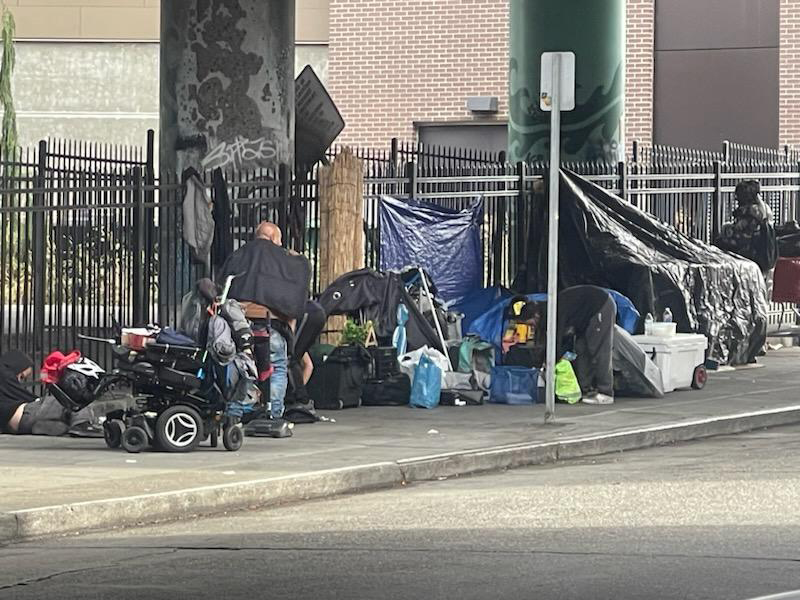
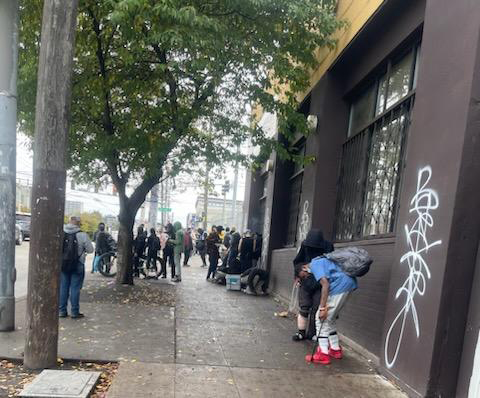
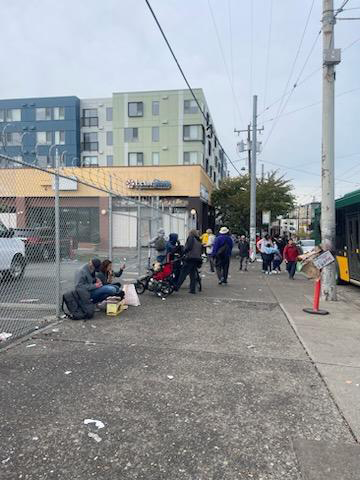
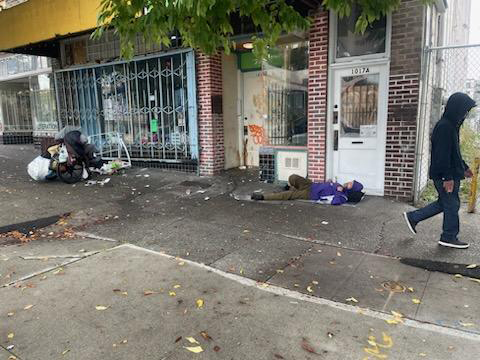
Having a satellite precinct right at 12th and Jackson is a great idea. It should have been the first thing to consider when tenants began leaving. Using those empty spaces for some kind of drop in center with office space for outreach workers or ambassadors right next to a facility with armed responders next door would also be a plus. Investing in that and security cameras in the area could have made the difference a long time ago. It is my understanding the DECS staff do not do any work outside of their building.
Overall, it would have cost less to be proactive here. I am still concerned that arrests aren’t the answer even with the initial news the new policy seems to be working. Addicts might accept services, but only temporarily, then slip right back into the habit given the power fentanyl has on the human brain.
In New Mexico the state Medicaid program pays for auricular acupuncture for addiction and other issues. That state has a 40 hour certification program for a lower level trained provider to work in addiction medicine without having to complete, and pay for, a full 2 year acupuncture training program. I’ve written my state legislators asking them to put forward a bill to have similar providers here in WA State. I’ve written them twice now. None have responded.
It’s great to see a group working on this. I wish I knew about it so I could have attended myself. I am unimpressed by the city and county efforts here to date.
I have to wonder what kind of effort the CIDBIA has been committing to fighting the crime and perception of safety issues in our neighborhood. B Are they attacking the problem? Except for the anti-graffiti and clean alleys program headed by Yong Kang, I don’t see any effort to improve the CID by the BIA.